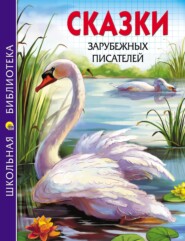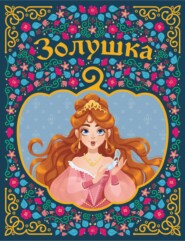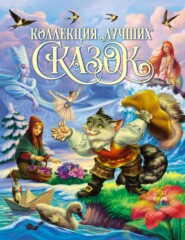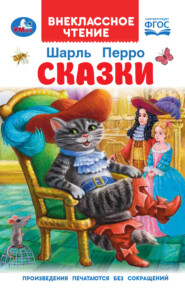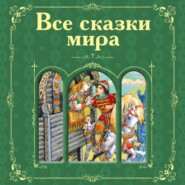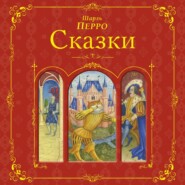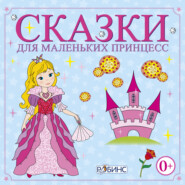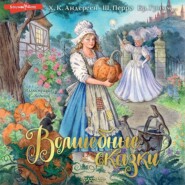По всем вопросам обращайтесь на: info@litportal.ru
(©) 2003-2024.
✖
Old-Time Stories
Настройки чтения
Размер шрифта
Высота строк
Поля
Once more she cried:
'Anne, Sister Anne, do you see nothing coming?'
'I see,' replied her sister, 'two horsemen who come this way, but they are as yet a long way off… Heaven be praised,' she exclaimed a moment later, 'they are my brothers… I am signalling to them all I can to hasten.'
Blue Beard let forth so mighty a shout that the whole house shook. The poor wife went down and cast herself at his feet, all dishevelled and in tears.
'That avails you nothing,' said Blue Beard; 'you must die.'
Seizing her by the hair with one hand, and with the other brandishing the cutlass aloft, he made as if to cut off her head.
The poor woman, turning towards him and fixing a dying gaze upon him, begged for a brief moment in which to collect her thoughts.
'No! no!' he cried; 'commend your soul to Heaven.' And raising his arm —
At this very moment there came so loud a knocking at the gate that Blue Beard stopped short. The gate was opened, and two horsemen dashed in, who drew their swords and rode straight at Blue Beard. The latter recognised them as the brothers of his wife – one of them a dragoon, and the other a musketeer – and fled instantly in an effort to escape. But the two brothers were so close upon him that they caught him ere he could gain the first flight of steps. They plunged their swords through his body and left him dead. The poor woman was nearly as dead as her husband, and had not the strength to rise and embrace her brothers.
It was found that Blue Beard had no heirs, and that consequently his wife became mistress of all his wealth. She devoted a portion to arranging a marriage between her sister Anne and a young gentleman with whom the latter had been for some time in love, while another portion purchased a captain's commission for each of her brothers. The rest formed a dowry for her own marriage with a very worthy man, who banished from her mind all memory of the evil days she had spent with Blue Beard.
BEAUTY AND THE BEAST
Once upon a time there lived a merchant who was exceedingly rich. He had six children – three boys and three girls – and being a sensible man he spared no expense upon their education, but engaged tutors of every kind for them. All his daughters were pretty, but the youngest especially was admired by everybody. When she was small she was known simply as 'the little beauty,' and this name stuck to her, causing a great deal of jealousy on the part of her sisters.
This youngest girl was not only prettier than her sisters, but very much nicer. The two elder girls were very arrogant as a result of their wealth; they pretended to be great ladies, declining to receive the daughters of other merchants, and associating only with people of quality. Every day they went off to balls and theatres, and for walks in the park, with many a gibe at their little sister, who spent much of her time in reading good books.
Now these girls were known to be very rich, and in consequence were sought in marriage by many prominent merchants. The two eldest said they would never marry unless they could find a duke, or at least a count. But Beauty – this, as I have mentioned, was the name by which the youngest was known – very politely thanked all who proposed marriage to her, and said that she was too young at present, and that she wished to keep her father company for several years yet.
Suddenly the merchant lost his fortune, the sole property which remained to him being a small house in the country, a long way from the capital. With tears he broke it to his children that they would have to move to this house, where by working like peasants they might just be able to live.
The two elder girls replied that they did not wish to leave the town, and that they had several admirers who would be only too happy to marry them, notwithstanding their loss of fortune. But the simple maidens were mistaken: their admirers would no longer look at them, now that they were poor. Everybody disliked them on account of their arrogance, and folks declared that they did not deserve pity: in fact, that it was a good thing their pride had had a fall – a turn at minding sheep would teach them how to play the fine lady! 'But we are very sorry for Beauty's misfortune,' everybody added; 'she is such a dear girl, and was always so considerate to poor people: so gentle, and with such charming manners!'
There were even several worthy men who would have married her, despite the fact that she was now penniless; but she told them she could not make up her mind to leave her poor father in his misfortune, and that she intended to go with him to the country, to comfort him and help him to work. Poor Beauty had been very grieved at first over the loss of her fortune, but she said to herself:
'However much I cry, I shall not recover my wealth, so I must try to be happy without it.'
When they were established in the country the merchant and his family started working on the land. Beauty used to rise at four o'clock in the morning, and was busy all day looking after the house, and preparing dinner for the family. At first she found it very hard, for she was not accustomed to work like a servant, but at the end of a couple of months she grew stronger, and her health was improved by the work. When she had leisure she read, or played the harpsichord, or sang at her spinning-wheel.
Her two sisters, on the other hand, were bored to death; they did not get up till ten o'clock in the morning, and they idled about all day. Their only diversion was to bemoan the beautiful clothes they used to wear and the company they used to keep. 'Look at our little sister,' they would say to each other; 'her tastes are so low and her mind so stupid that she is quite content with this miserable state of affairs.'
The good merchant did not share the opinion of his two daughters, for he knew that Beauty was more fitted to shine in company than her sisters. He was greatly impressed by the girl's good qualities, and especially by her patience – for her sisters, not content with leaving her all the work of the house, never missed an opportunity of insulting her.
They had been living for a year in this seclusion when the merchant received a letter informing him that a ship on which he had some merchandise had just come safely home. The news nearly turned the heads of the two elder girls, for they thought that at last they would be able to quit their dull life in the country. When they saw their father ready to set out they begged him to bring them back dresses, furs, caps, and finery of every kind. Beauty asked for nothing, thinking to herself that all the money which the merchandise might yield would not be enough to satisfy her sisters' demands.
'You have not asked me for anything,' said her father.
'As you are so kind as to think of me,' she replied, 'please bring me a rose, for there are none here.'
Beauty had no real craving for a rose, but she was anxious not to seem to disparage the conduct of her sisters. The latter would have declared that she purposely asked for nothing in order to be different from them.
The merchant duly set forth; but when he reached his destination there was a law-suit over his merchandise, and after much trouble he returned poorer than he had been before. With only thirty miles to go before reaching home, he was already looking forward to the pleasure of seeing his children again, when he found he had to pass through a large wood. Here he lost himself. It was snowing horribly; the wind was so strong that twice he was thrown from his horse, and when night came on he made up his mind he must either die of hunger and cold or be eaten by the wolves that he could hear howling all about him.
Suddenly he saw, at the end of a long avenue of trees, a strong light. It seemed to be some distance away, but he walked towards it, and presently discovered that it came from a large palace, which was all lit up.
The merchant thanked heaven for sending him this help, and hastened to the castle. To his surprise, however, he found no one about in the courtyards. His horse, which had followed him, saw a large stable open and went in; and on finding hay and oats in readiness the poor animal, which was dying of hunger, set to with a will. The merchant tied him up in the stable, and approached the house, where he found not a soul. He entered a large room; here there was a good fire, and a table laden with food, but with a place laid for one only. The rain and snow had soaked him to the skin, so he drew near the fire to dry himself. 'I am sure,' he remarked to himself, 'that the master of this house or his servants will forgive the liberty I am taking; doubtless they will be here soon.'
He waited some considerable time; but eleven o'clock struck and still he had seen nobody. Being no longer able to resist his hunger he took a chicken and devoured it in two mouthfuls, trembling. Then he drank several glasses of wine, and becoming bolder ventured out of the room. He went through several magnificently furnished apartments, and finally found a room with a very good bed. It was now past midnight, and as he was very tired he decided to shut the door and go to bed.
It was ten o'clock the next morning when he rose, and he was greatly astonished to find a new suit in place of his own, which had been spoilt. 'This palace,' he said to himself, 'must surely belong to some good fairy, who has taken pity on my plight.'
He looked out of the window. The snow had vanished, and his eyes rested instead upon arbours of flowers – a charming spectacle. He went back to the room where he had supped the night before, and found there a little table with a cup of chocolate on it. 'I thank you, Madam Fairy,' he said aloud, 'for being so kind as to think of my breakfast.'
Having drunk his chocolate the good man went forth to look for his horse. As he passed under a bower of roses he remembered that Beauty had asked for one, and he plucked a spray from a mass of blooms. The very same moment he heard a terrible noise, and saw a beast coming towards him which was so hideous that he came near to fainting.
'Ungrateful wretch!' said the Beast, in a dreadful voice; 'I have saved your life by receiving you into my castle, and in return for my trouble you steal that which I love better than anything in the world – my roses. You shall pay for this with your life! I give you fifteen minutes to make your peace with Heaven.'
The merchant threw himself on his knees and wrung his hands. 'Pardon, my lord!' he cried; 'one of my daughters had asked for a rose, and I did not dream I should be giving offence by picking one.'
'I am not called "my lord,"' answered the monster, 'but "The Beast." I have no liking for compliments, but prefer people to say what they think. Do not hope therefore to soften me by flattery. You have daughters, you say; well, I am willing to pardon you if one of your daughters will come, of her own choice, to die in your place. Do not argue with me – go! And swear that if your daughters refuse to die in your place you will come back again in three months.'
The good man had no intention of sacrificing one of his daughters to this hideous monster, but he thought that at least he might have the pleasure of kissing them once again. He therefore swore to return, and the Beast told him he could go when he wished. 'I do not wish you to go empty-handed,' he added; 'return to the room where you slept; you will find there a large empty box. Fill it with what you will; I will have it sent home for you.'
With these words the Beast withdrew, leaving the merchant to reflect that if he must indeed die, at all events he would have the consolation of providing for his poor children.
He went back to the room where he had slept. He found there a large number of gold pieces, and with these he filled the box the Beast had mentioned. Having closed the latter, he took his horse, which was still in the stable, and set forth from the palace, as melancholy now as he had been joyous when he entered it.
The horse of its own accord took one of the forest roads, and in a few hours the good man reached his own little house. His children crowded round him, but at sight of them, instead of welcoming their caresses, he burst into tears. In his hand was the bunch of roses which he had brought for Beauty, and he gave it to her with these words:
'Take these roses, Beauty; it is dearly that your poor father will have to pay for them.'
Thereupon he told his family of the dire adventure which had befallen him. On hearing the tale the two elder girls were in a great commotion, and began to upbraid Beauty for not weeping as they did. 'See to what her smugness has brought this young chit,' they said; 'surely she might strive to find some way out of this trouble, as we do! But oh, dear me, no; her ladyship is so determined to be different that she can speak of her father's death without a tear!'
'It would be quite useless to weep,' said Beauty. 'Why should I lament my father's death? He is not going to die. Since the monster agrees to accept a daughter instead, I intend to offer myself to appease his fury. It will be a happiness to do so, for in dying I shall have the joy of saving my father, and of proving to him my devotion.'
'No, sister,' said her three brothers; 'you shall not die; we will go in quest of this monster, and will perish under his blows if we cannot kill him.'
'Do not entertain any such hopes, my children,' said the merchant; 'the power of this Beast is so great that I have not the slightest expectation of escaping him. I am touched by the goodness of Beauty's heart, but I will not expose her to death. I am old and have not much longer to live; and I shall merely lose a few years that will be regretted only on account of you, my dear children.'
'I can assure you, father,' said Beauty, 'that you will not go to this palace without me. You cannot prevent me from following you. Although I am young I am not so very deeply in love with life, and I would rather be devoured by this monster than die of the grief which your loss would cause me.' Words were useless. Beauty was quite determined to go to this wonderful palace, and her sisters were not sorry, for they regarded her good qualities with deep jealousy.
The merchant was so taken up with the sorrow of losing his daughter that he forgot all about the box which he had filled with gold. To his astonishment, when he had shut the door of his room and was about to retire for the night, there it was at the side of his bed! He decided not to tell his children that he had become so rich, for his elder daughters would have wanted to go back to town, and he had resolved to die in the country. He did confide his secret to Beauty, however, and the latter told him that during his absence they had entertained some visitors, amongst whom were two admirers of her sisters. She begged her father to let them marry; for she was of such a sweet nature that she loved them, and forgave them with all her heart the evil they had done her.
When Beauty set off with her father the two heartless girls rubbed their eyes with an onion, so as to seem tearful; but her brothers wept in reality, as did also the merchant. Beauty alone did not cry, because she did not want to add to their sorrow.
The horse took the road to the palace, and by evening they espied it, all lit up as before. An empty stable awaited the nag, and when the good merchant and his daughter entered the great hall, they found there a table magnificently laid for two people. The merchant had not the heart to eat, but Beauty, forcing herself to appear calm, sat down and served him. Since the Beast had provided such splendid fare, she thought to herself, he must presumably be anxious to fatten her up before eating her.
When they had finished supper they heard a terrible noise. With tears the merchant bade farewell to his daughter, for he knew it was the Beast. Beauty herself could not help trembling at the awful apparition, but she did her best to compose herself. The Beast asked her if she had come of her own free will, and she timidly answered that such was the case.
'You are indeed kind,' said the Beast, 'and I am much obliged to you. You, my good man, will depart to-morrow morning, and you must not think of coming back again. Good-bye, Beauty!'







